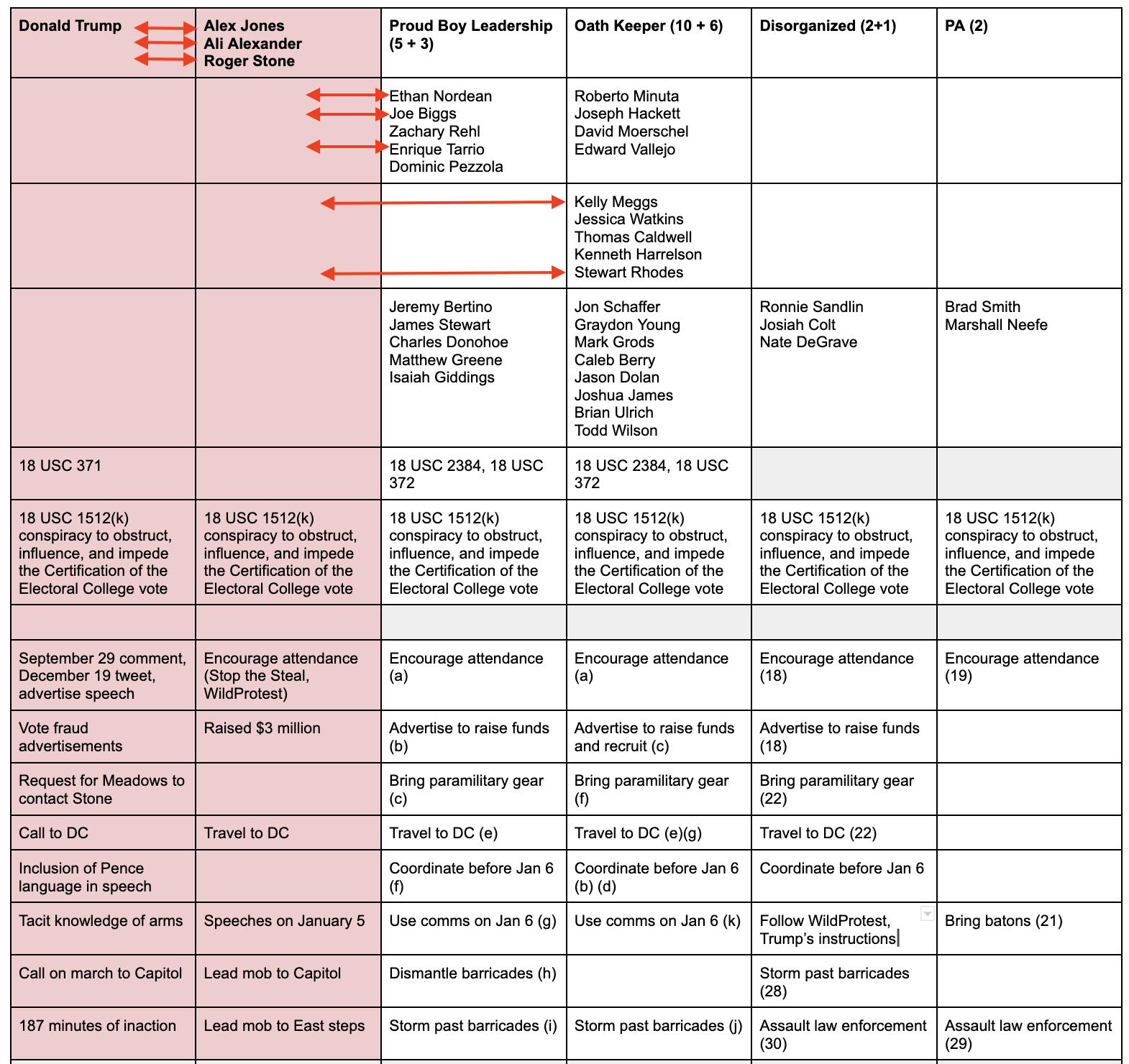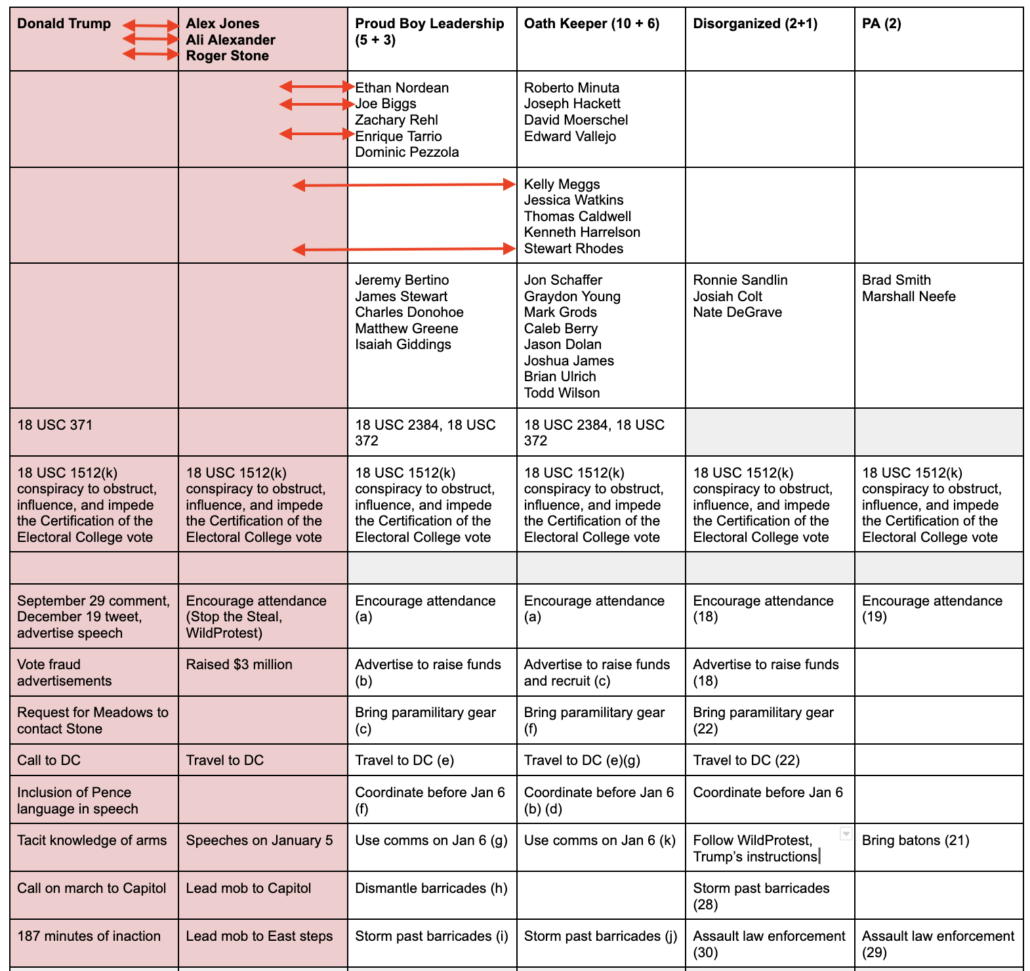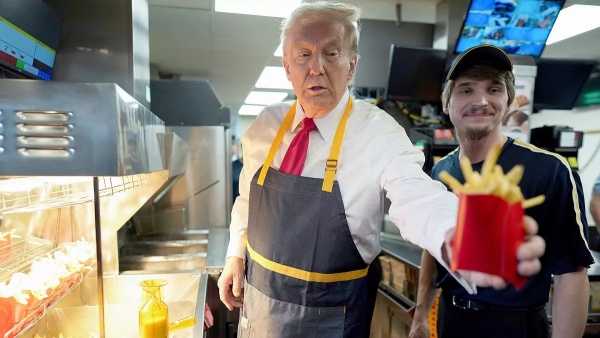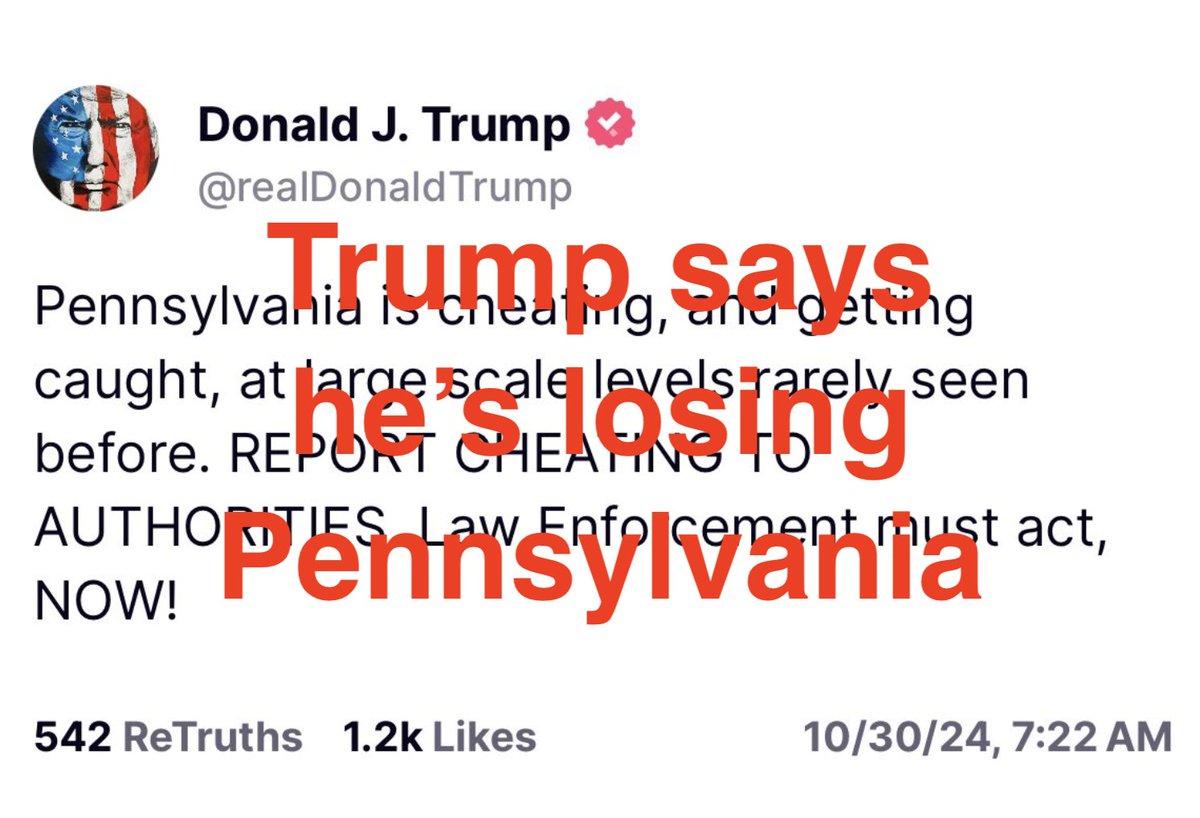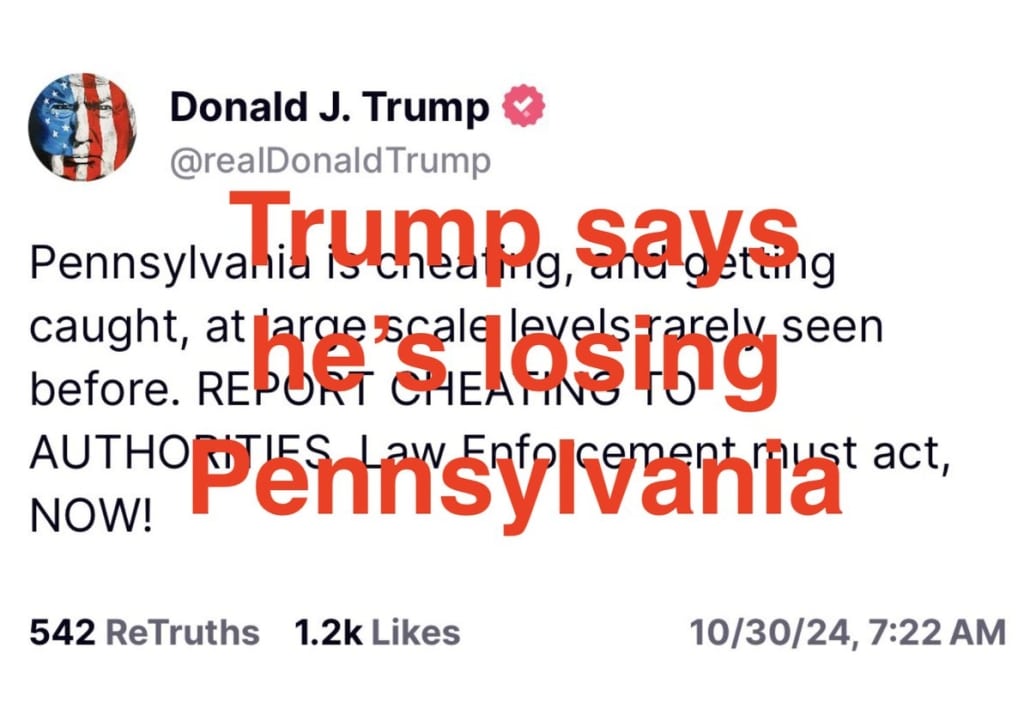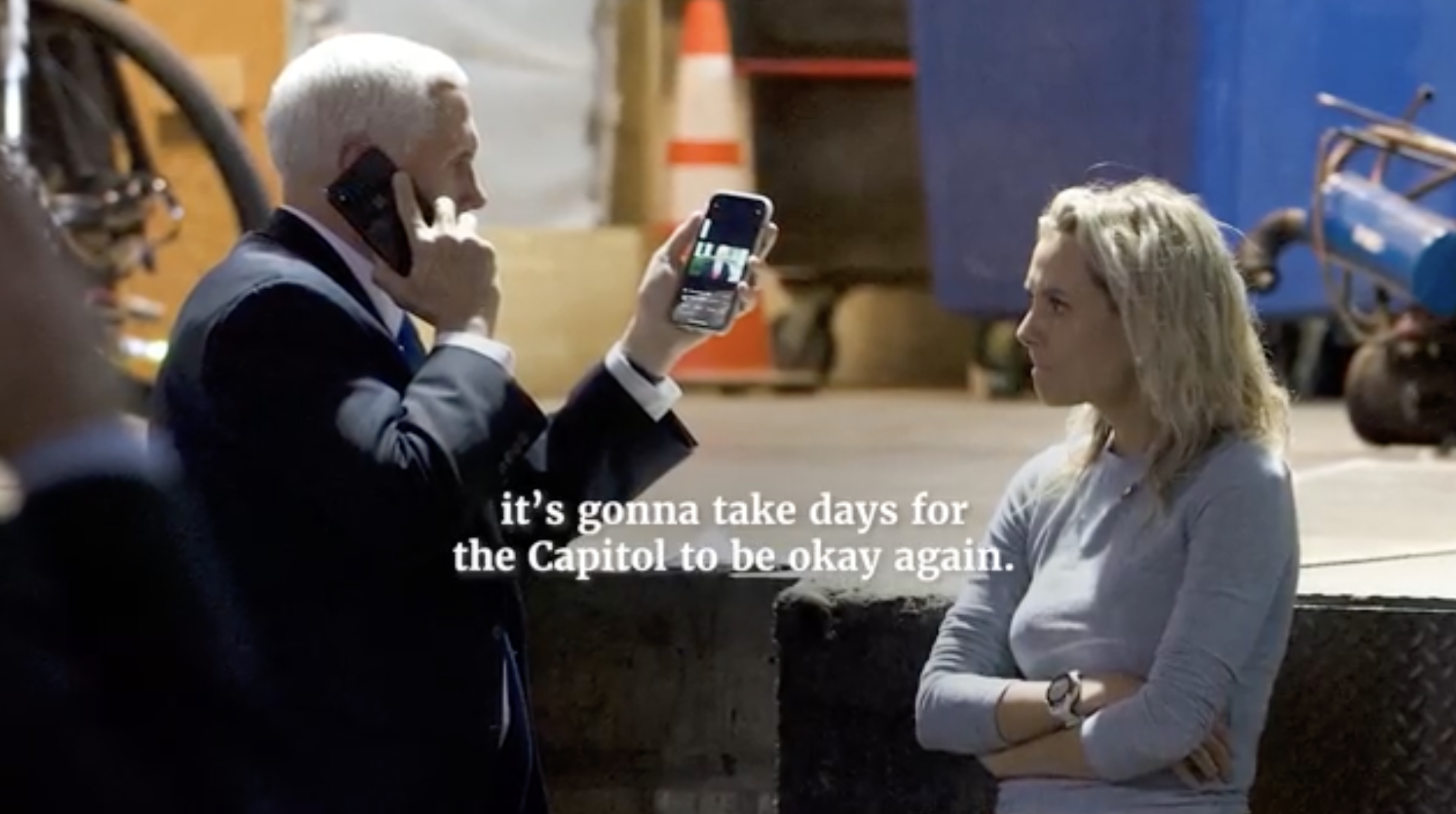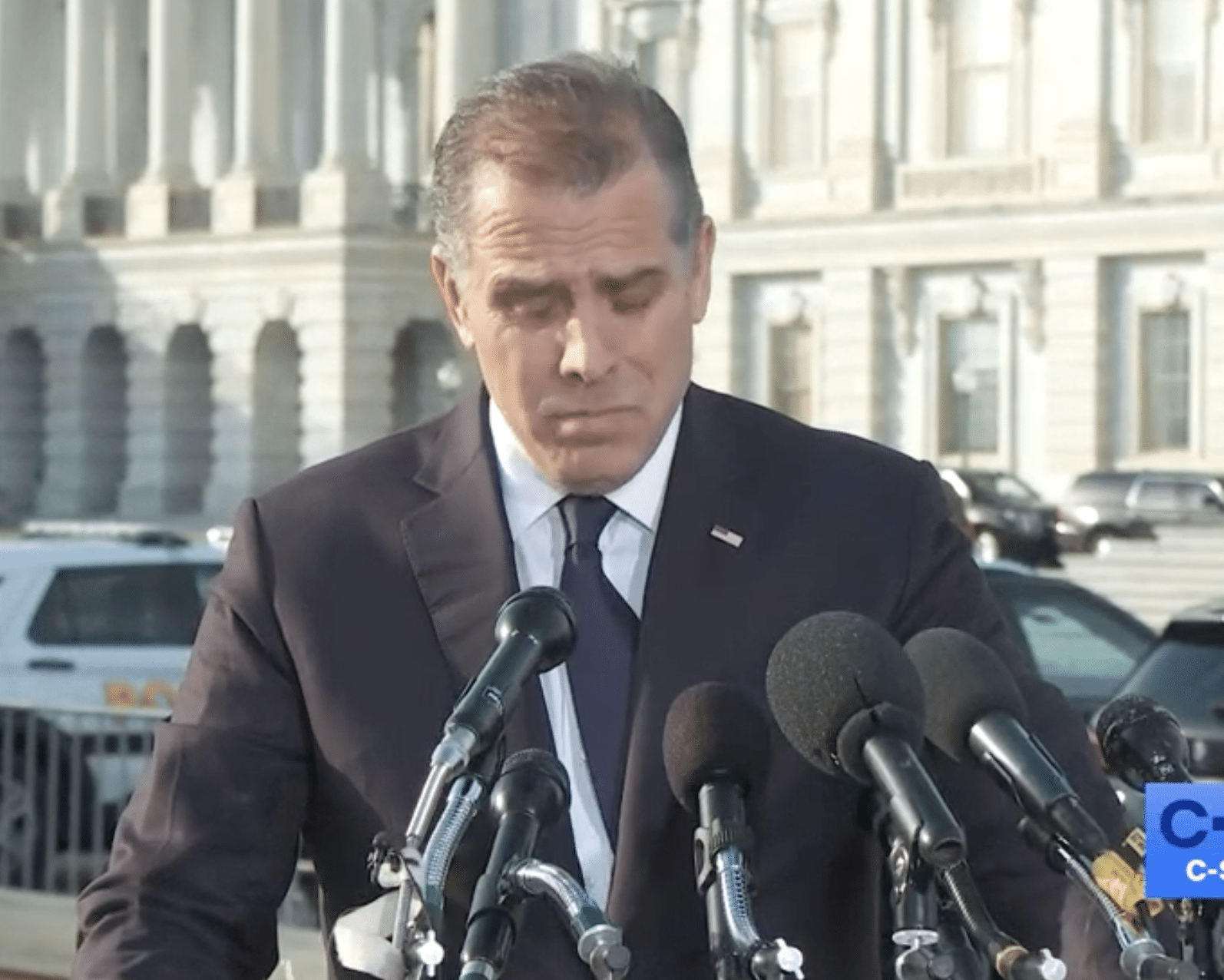[NB: check the byline, thanks. /~Rayne]
Trump cosplayed this weekend before his Nazi love fest in Madison Square Garden, using a photo of himself in his McDonald’s costume in a social media post:
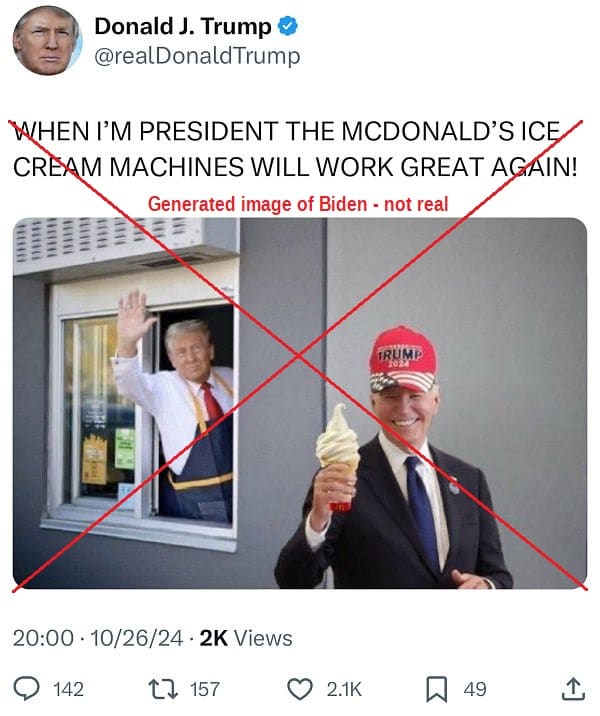
Funny how he depicts Biden in real presidential attire, as if Trump’s unconscious recognizes he is not presidential while Biden is.
(Trump also claimed unearned credit for repairing ice cream equipment resolved wholly without his participation in any way.)
He cosplayed once again today, pretending to drive a truck:
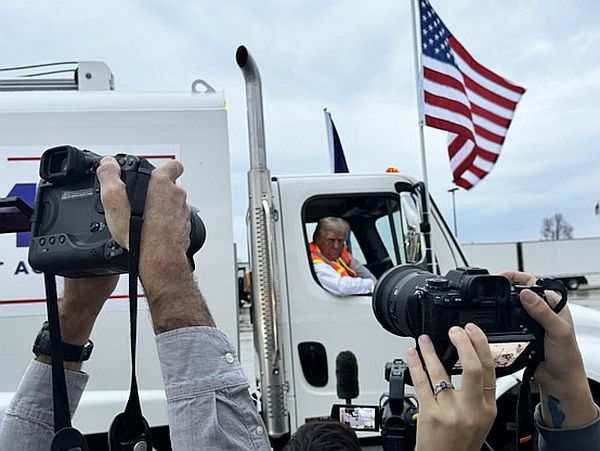
It’s still just dress up, though.
Trump is playing around, including using his image like a child would have used a paper doll decades ago. Pop Mr. Trump in a McDonald’s drive-thru, add his nemesis Mr. Biden with an ice cream because Mr. Biden likes ice cream, get it? What a good job, Donnie. What will you do with a photo of you “driving” a truck?
Meanwhile, reality grinds on, chewing up real lives and crushing real futures.
Trump’s responses to reality remain as flat and shallow as his playtime.
~ ~ ~
I had a moment recently, before Trump indulged in his McDonald’s cosplay fixation. I was triggered deeply as I packed up to leave my classroom; I made it to my car where I managed to fend off a PTSD panic attack.
Yes, I’m back in school. I’m pursuing another degree as part of a personal goal. I’m on campus in class several times a week. It’s a little awkward at times being older than the rest of the students, half of which are freshmen, not to mention being older than the instructors.
At my age the experience is also a solid kick in the head. Two months into class I’ve realized that I’ve forgotten so much about my own experience beginning college. My fellow students bring it all back.
I had forgotten how goddamned poor I was then. Some weeks I just barely scraped by living on dimes obtained by scavenging soft drink cans and turning them it for the deposit money. Thank goodness Michigan has had a bottle deposit law for decades or it would have been even worse.
A classmate reminded me unintentionally of the experience when they mentioned they would have to see if they could afford the necessary supplies for our next class segment after they got their next paycheck.
In contrast, as soon as I had received an email that I was approved for this class I’d ordered everything I needed all at once. I order double of a few items, didn’t even give the cost a second thought.
It wasn’t always this way. Back in 1978 when I was starving student I’d have had to ask for extra hours at work or find a way to defer a payment in order to purchase something required for a class.
Eventually I had to leave school because I couldn’t afford tuition and fees. In the big picture it all worked out – I landed jobs with companies that paid my tuition – but my late teens and early twenties were really grim. The Reagan years I’d rather not recall at all, thank you.
It was incredibly difficult to make ends meet on 20-36 hours a week at minimum wage jobs. I was fortunate I never had to work in fast food though I’d applied for my share of those jobs. I dreaded the possibility I’d not only get shitty hours I couldn’t count on from week to week, but I might come home smelling like catsup-mustard-onions-pickles with a coating of fryer grease.
A close friend who worked for a major fast food chain couldn’t get the odor out of their hair and skin; it embedded itself in any synthetic fabric. They smelled like a Wendy’s burger for as long as they worked there. Kamala Harris knows what this is like, the feeling of being branded by a necessary but short-term low-wage job.
Cosplayers don’t have to deal with that reality.
Because I worked in retail for a decade, my uniform was business professional with nylons and heels. No apron or hairnet required but 4 to 8 hours on your feet in 2-3 inch heels isn’t fun. It screws with your feet and posture for years afterward.
(Heel spurs, Donnie? Hah. What a pussy.)
Doing stock work in this kind of attire is also distinctly unpleasant, humping bulky and heavy inventory from boxes in the back room to the front of the store to hang on rods you may have just finished waxing, also part of the job while wearing a smile for customers.
I dreaded the stock work because I might ruin a pair of pantyhose. They’d cost me a couple hours’ pay to replace before my next shift. Don’t snap off a heel or break a shoe strap because that’s a week’s pay to repair and more to replace.
Gods help me if the vehicle I relied on – not mine as I couldn’t afford payments, plates, insurance – needed repairs, the cost of which I’d have to help absorb.
If you’re cosplaying you don’t have to worry about little financial set backs like these.
Thankfully I was healthy then. I also didn’t have to worry about my family or daycare at the time.
Unfortunately my classmate not only has to count pennies to afford the next class segment, but their remaining parent is suffering from a life-threatening illness. You know where much of the household’s income is going – right into Big Pharma’s pockets.
That detail isn’t included in the cosplay kit.
Cosplaying a minimum wage worker’s job is simply not the same as actually doing their job, not the same as living their life.
It’s so fucking hard in reality that I “forgot” about it decades later, blocking the unpleasantness of hardship. I also know that it’s considerably more difficult now than it was back then. Health care alone is a nightmare, even with Affordable Care Act coverage.
~ ~ ~
Math is also not part of the cosplayer’s kit.
In reality, the math is inescapable.
There’s no escaping the fact the federal minimum wage is $7.25 per hour and it’s been that since 2009. Minimum tipped wage is $2.13 per hour provided base wage and tips total $7.25 per hour.
States’ minimum wage may be more, but 21 states’ minimum wages are also $7.25 per hour.
Doesn’t matter if individual state’s cost of living index is higher or lower than the average.
Which means the expenses have steadily outstripped wages for years.
Minimum wage jobs are rarely full-time because employers who need cheap labor also don’t want to pay unemployment. The most part-time workers can expect is 36 hours a week and probably not regularly to avoid the appearance of full-time work.
Most will average 20-36 hours a week.
Which means gross pay is somewhere between $145 and $261 a week, or $7540 to $13572 a year.
Now take those numbers and analyze them using NerdWallet’s average monthly expenses by category:
The average expenditures among all consumer units totaled $77,280 annually. That’s up 5.9% from 2022.
Average monthly expenses for housing:
Average expenses for housing totaled $25,436 annually. That works out to $2,120 per month.
Average monthly expenses for transportation:
$13,174 annually. That works out to $1,098 per month.
Average monthly expenses for food:
$9,985 annually. That works out to $832 per month.
Average monthly expenses for personal insurance and pensions:
$9,556 annually. That works out to $796 per month.
Average monthly expenses for entertainment:
$3,635 annually. That works out to $302 per month.
Average. Monthly. Expenses. There’s no way a single person working 20-36 hours a week for federal minimum wage comes close to covering half of these expenses, even if insurance, pensions, and entertainment are completely removed from the calculations.
BLS Employment Cost Index for July 31, 2024 indicates wages have increased, but whose wages and where?
… Wages and salaries increased 4.2 percent for the 12-month period ending in June 2024 and increased 4.6 percent for the 12-month period ending in June 2023. Benefit costs increased 3.8 percent over the year and increased 4.2 percent for the 12-month period ending in June 2023. …
Chances are good these increases still don’t make a dent anywhere in the U.S. when benefits also increased and corporations continue to gouge consumers on top of it to make record profits.
Cosplayer TFG may actually know a little bit about this but from the perspective of a landlord and an employer. He’s cheated renters in his lifetime violating the Fair Housing Act and hired undocumented workers repeatedly because he won’t pay a living or legally-mandated wage to documented workers.
No cosplay required – the guy who’s familiar with this bit of economics wears a blue suit and red tie when he’s not wearing a white golf shirt and khaki golf slacks.
He wants to do this kind of cheating on housing and wages all the time to every American.
No costume required to be an asshole.
~ ~ ~
Let me be more direct: Cosplayer TFG has avoided answering questions about increasing the minimum wage, failing to respect working Americans by offering a bullshit response:
Trump held a campaign photo op Sunday at a McDonald’s in swing-state Pennsylvania, where he was asked about raising the minimum wage.
“Well, I think this. These people work hard. They’re great,” the Republican nominee responded.
The vice president pounced on the remark, criticizing Trump on Monday by saying that she “absolutely” believed in raising the minimum wage to ensure that “hardworking Americans, whether they’re working at McDonald’s or anywhere else, should have at least the ability to be able to take care of their family.”
No wonder he hid behind his McDonald’s costume or climbed into another truck cab.
~ ~ ~
I wish I could assure my classmate that there’s an end to this hardship in sight soon, that there will be elected officials who will work as hard as they do to ensure they get the opportunities they need and a lifeline when necessary.
But that’s on all of you who have yet to vote and aren’t in my class this term.
We aren’t going back. Do something and make this better. Vote for someone who understands what it’s going to take and is willing to do it. Vote for the candidates down ticket who’ll help her deliver.
Vote for somebody who isn’t going to cosplay at working while being a fascist slacker in reality.



